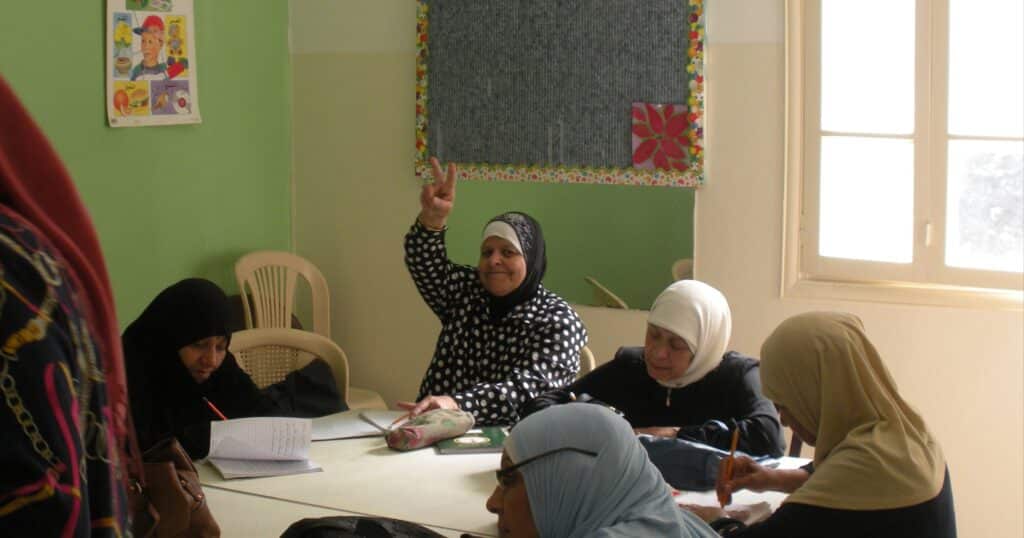UCC ministries, partners support refugees near and far with One Great Hour of Sharing
From Pennsylvania to Palestine and many locations around the world, the United Church of Christ is working with partners and communities to respond to the more than 25 million global refugees.
One Great Hour of Sharing invites congregations and individuals across the church to help make this work possible. Funds from this annual UCC mission offering go toward assisting refugee and asylum seekers, among addressing other international and domestic needs through Wider Church Ministries.
Offering welcome
In Lancaster, a county in Pennsylvania that has been referred to as “America’s refugee capital” because of the high number of refugees who resettle there per capita, faith-based partners have been crucial for meeting community needs for these individuals and families.
When Linda Lewis introduced the idea to host a refugee family through Church World Service Lancaster to Church of the Apostles UCC where she attends, the congregation rallied to form a welcome team for the task. Lewis headed the team, and the congregation gathered household goods and gift cards in preparation for a family to arrive in early 2022.
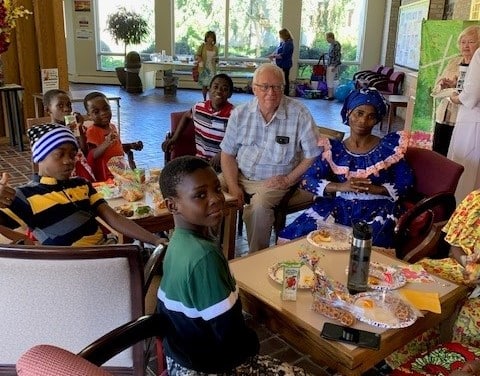
The team welcomed a family of three from the Democratic Republic of the Congo. “When they first came, we were responsible for taking them to medical appointments, the grocery store, the Social Security office, a local clothing bank, getting registered at school and setting up banking,” Lewis said. She knew of a pre-K program in the local schools and helped the family get one of the younger children enrolled.
Just days after the family arrived, CWS learned that another family was arriving who were relatives of the first. The welcome team agreed to serve as local hosts for this family as well.
Creating community connections
Coordinating churches to accompany refugees during their first months of arriving in the United States is an important part of how CWS serves refugees, one that Andrew Mashas focuses on as the faith-based engagement specialist. While CWS assists families with key resources like finding safe, affordable housing, linking with healthcare providers and offering extensive employment assistance, the ability to connect families with local churches as co-sponsors creates additional community relationships.
“We have services that we provide, but that community connection is integral for every family’s integration in the community,” Mashas said. “That is important for families who are experiencing a whole lot — helping them with things we take for granted like trying to navigate grocery stores, mail, bills, kids’ homework when trying to learn English. It really multiples our efforts in bringing families to a place of self-sufficiency.”
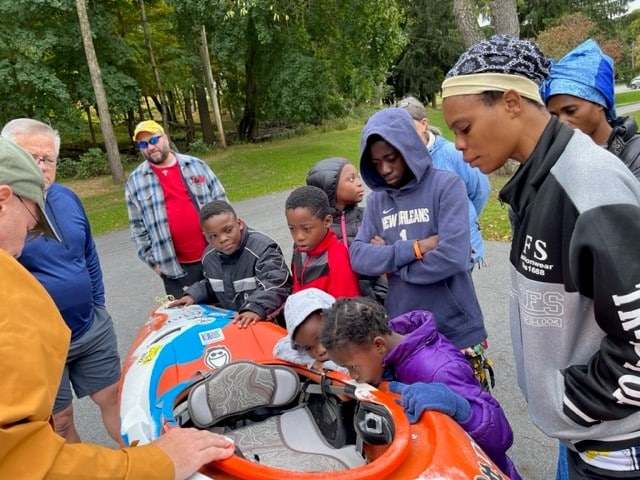
Lewis and the Church of the Apostles have developed relationships with the two families that have lasted long past the end of their official role in the CWS welcome program. Lewis has connected the children with her grandkids and invites the families to church activities, such as a kayaking trip in the park.
“I would recommend other churches get involved so they learn about people from other cultures,” Lewis said. “And it’s a great feeling to know that you’re helping.”
No church too small
Mashas hopes that churches realize no matter their size or capacity, they have something valuable to offer in resettlement support. He referenced the widow who is commended by Jesus for offering her two small coins in Mark 12:41-44.
“I don’t want churches to think that they have nothing to offer because they’re too small. Maybe having a widow-with-her-two-coins mindset is needed — looking at what churches have in abundance instead of looking at what might be scarce. When it comes to refugee resettlement, the support is needed regardless of if you’re a megachurch or a church of 30 folks who meet on Sunday and try to figure life out,” Mashas said.
The Rev. Irene Hassan, UCC minister for refugee and migration services, emphasized the importance of building a well-resourced network like this one to welcome migrants into their communities.
“There’s immeasurable value in working with trusted professional partners when hosting vulnerable populations,” she said. “Local refugee offices can provide best practices to churches seeking to host migrants that can make an immeasurable difference in the resettlement success of those populations.”
Funds from OGHS go toward supporting UCC partnerships in resettlement work, including this one with CWS.
“Church World Service has always been a supportive partner of the UCC, and we celebrate any connections churches make with CWS to welcome migrants with dignity and equity,” Hassan added.
‘Serving the whole community’
The work to support migrants and refugees with dignity happens in communities across the globe.
“The UCC has been engaged in supporting the work of partners responding to the needs of Palestinian refugees since the ’60s,” said Peter Makari, global relations minister for the Middle East and Europe of Global Ministries.
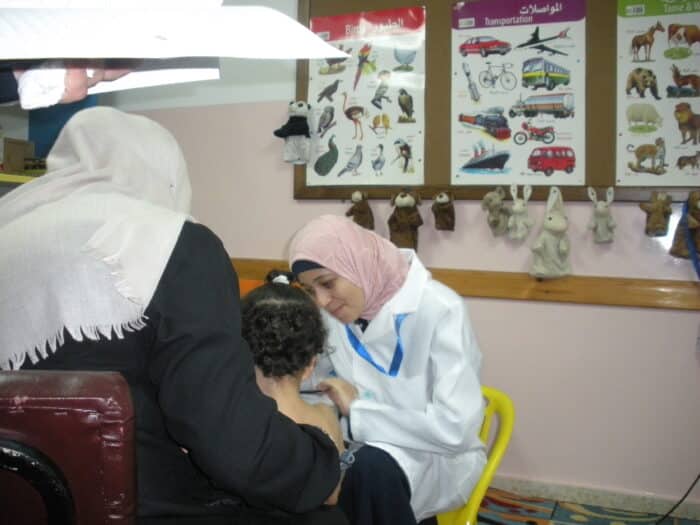
In work that supports UCC resolutions addressing Israel/Palestine, OGHS funds help to address the needs of Palestinian refugees through partnerships with the Department of Service to Palestinian Refugees of the Middle East Council of Churches, the East Jerusalem YMCA and the YWCA of Palestine.
Makari pointed to Gaza as an area that, at 25 miles long, is one of the most densely populated areas in the world, with three-fourths of the two million people refugees. Many of them fled from their communities during the 1948 war that displaced more than 750,000 Palestinians.
Health clinics and programs for children are key resources offered by DSPR in the “ongoing emergency situation” in Gaza. On a visit to these clinics, Makari witnessed their importance to an area that only has two hospitals and lacks adequate healthcare “partly because of the blockade and partly because of an inability to access clean water and sufficient food,” he said. Israel has been blockading Gaza since 2007.
“These are clinics that serve the whole community — anyone is able to come,” Makari said. “They provide basic care and people rely on it.” Services include prenatal care for women, healthcare for young children, dentistry and access to medicine.
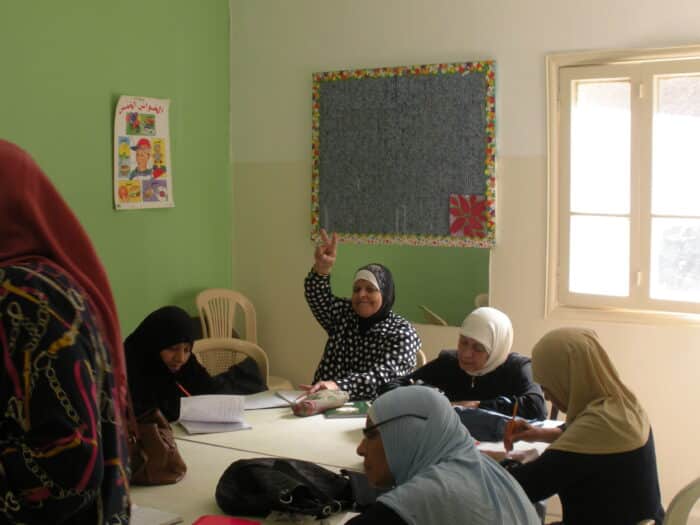
“The faith-based community has been present since the beginning of the refugee crisis in the late 1940s, providing services alongside the United Nations. But the UN Relief and Works Agency’s abilities are challenged and fall short due to chronic underfunding,” he said.
‘Lift up the voices of refugees’
Other programs for refugees in and around Palestine offer literacy education for women, small enterprise training, such as in Jericho where the YWCA has a bakery that sells products made by women, and vocational training that teaches carpentry, mechanics, and computer and phone repair. There are also programs to meet mental health needs for children that prioritize health, play, dance and physical activities — ways to help children cope with the trauma of living under the constant threat of attack.
As the population continues to grow in Gaza, and limited electricity and clean water creates difficult conditions for the people living there, Makari emphasized the importance of finding ways to care for our neighbors, even as these neighbors are partly around the world.
“Funds shared through One Great Hour of Sharing go to support those programs, but also to lift up the voices of refugees and those who advocate for those rights,” he said. “That is critical because the voices of refugees are often not heard. This is an opportunity to lift up their voices.
“As we in the UCC work for ‘a just world for all,’ the Middle East is a part of the world that is in need of justice. The UCC and the Disciples of Christ through Global Ministries are able to offer support for lifechanging, life-sustaining ministries and work in the community, as well as advocate for the rights and raise awareness for the realities of the people there.”
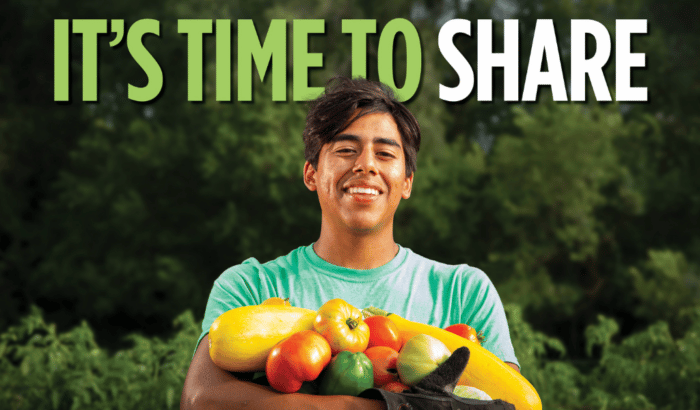
It’s time to share
Donations from One Great Hour of Sharing reach into many areas of life-changing ministry. In addition to supporting the needs of refugees, funds go toward disaster relief and sustainable development, both domestically and around the globe.
Wider Church Ministries suggest Sunday, March 19, as the OGHS offering date. This year’s theme is “It’s Time to Share.” Worship resources, videos, images and activities for children and youth are available for congregations to use.
Congregations and individuals can donate to OGHS here.
Content on ucc.org is copyrighted by the National Setting of the United Church of Christ and may be only shared according to the guidelines outlined here.
Related News
A Prophetic Call for Justice and Peace in Palestine
The executive leaders of the United Church of Christ have issued the following statement...
Read More‘Love is Greater Than Fear’: Regional Youth Events get to the heart of gospel message
United Church of Christ teens attending this summer’s Regional Youth Events (RYE) are...
Read MoreUCC desk calendars available to order now
Prepare for your day, month and year with the United Church of Christ desk calendar —...
Read More